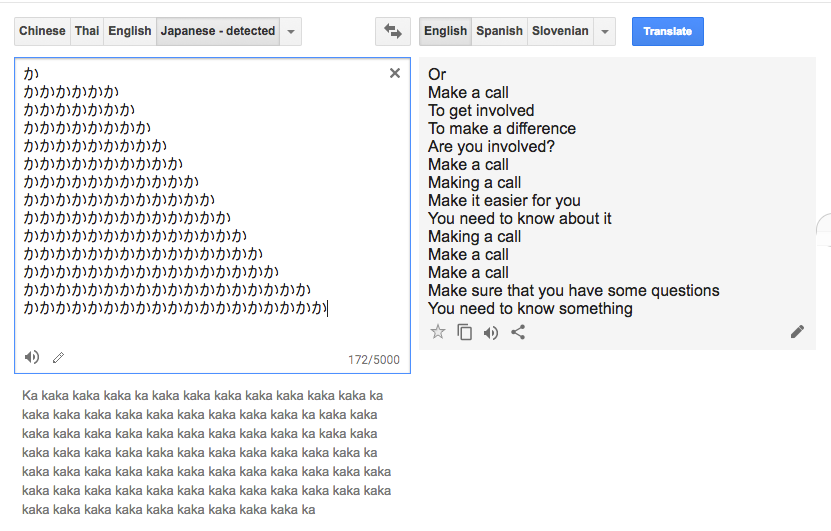Archive for October, 2017
Civilized urinating
Is this Chinglish?
Source: "Lost in translation: Chinese government aims to reduce awkward English signs" (CBS News [10/28/17]), with several other prime examples.
Read the rest of this entry »
Presidential fluency
In a number of posts about Donald Trump's rhetorical style, I've noted how seldom he uses filled pauses such as UM and UH in spontaneous speech, compared to other public figures. For example, in "The narrow end of the funnel" (8/18/2016), I noted that filled pauses were 8.2% of Steve Bannon's words (in a sample passage from a panel discussion on The Future of Conservatism), and 4.0% of Hilary Clinton's words in a Vox interview, while three of Trump's unscripted rally speeches had between 0% and 0.05% filled pauses, and in a CNBC interview, Trump used 74 filled pauses in 5329 words, for a rate of 1.4%.
Like many others, I've noted how often Trump abandons a discourse thread in mid-phrase, sometimes returning to it after a digression, and sometimes just forging ahead with new themes. (See e.g. "The em-dash candidate" (8/15/2016) and "Disfluencies and smiles" (9/30/2016).) And I've certainly also noted his fondness for phrasal repetitions, sometimes literal and sometimes transformed or paraphrased, which is one of the factors leading to his low rate of vocabulary display. (See "Donald Trump's repetitive rhetoric" (12/5/2015), "Trump's rhetorical style" (12/26/2015), "Vocabulary display in the CNN debate" (9/18/2015), "Political vocabulary display" (9/10/2015), and "More political text analytics" (4/15/2016).)
But I don't believe that I've noted, at least quantitatively, how rarely Donald Trump exhibits the type of disfluency where the leading edge of a phrase is rapidly repeated, sometimes to correct a pronunciation or inflection, and sometimes just as an apparent hitch in the speech production process. Nor do I think I've noted how little dead air (AKA pause for thought) there is in his spontaneous speech.
Read the rest of this entry »
This is not a comedy sketch
At least, we're five months away from April Fool's Day…
 Lydia Wheeler, "Court rules request for 'lawyer dog' too 'ambiguous'", The Hill 10/30/2017:
Lydia Wheeler, "Court rules request for 'lawyer dog' too 'ambiguous'", The Hill 10/30/2017:
The Louisiana Supreme Court won't hear an appeal from a man who claimed he told police during an interview to "just give me a lawyer dog,” with a justice saying the request was "ambiguous." […]
[D]etectives reportedly advised the defendant of his Miranda rights, and the defendant stated he understood and waived those rights.
The defendant, however, claimed he invoked his right to counsel in a second police interview when he said “if y’all think I did it, I know that I didn’t do it so why don’t you just give me a lawyer dog cause this is not what’s up.” […]
“In my view, the defendant’s ambiguous and equivocal reference to a 'lawyer dog' does not constitute an invocation of counsel that warrants termination of the interview,” [Louisiana Supreme Court Justice Scott Crichton] said.
Read the rest of this entry »
Semantics at the Supreme Court
“What is the difference between ‘reasonably necessary’ and ‘substantial need’?” asked Supreme Court Justice Samuel Alito (see this story in the New York Times). “I have been racking my brain trying to think of something that it is reasonably necessary for me to obtain but as to which I do not have the substantial need. And I can’t think of an example.”
Several of the court’s more liberal justices disagreed, saying that “reasonably necessary” connoted matters that a reasonable lawyer with finite resources would try to pursue.
On the outcome there hangs the issue of whether death row inmates like Carlos Manuel Ayestas in Texas will get legal aid. A federal appeals court in New Orleans, which oversees cases from Louisiana, Mississippi and Texas, says there must a “substantial need” for the money, and denied funds to Ayestas. He challenged the denial.
So don't ever say there is no practical importance to the work semanticists do as they try to identify truth-conditional differences between terms of broadly similar meaning.
Permalink Comments off
Headlessness in North Korean propaganda
[This is a guest post by Jichang Lulu]
After coverage of dotage and DOLtage, as diagnosed by the Korean Central News Agency (KCNA), Victor Mair's latest Korean-themed post deals with a more serious condition: headlessness.
Varieties of the ailment have been reported in, e.g., chickens and compound nouns, but the latter sense would be out of place in KCNA vocabulary; (at least South) Korean linguists would talk of nouns 'lacking a nucleus' (핵어(核語) 없는 haegeo eomneun / 무핵(無核) muhaek 합성명사(合成名詞) hapseong myeongsa) rather than a 'head'. Another candidate for headlessness is the North Korean state itself, per OPLAN 5015 (작전계획(作戰計劃) 5015 jakjeon-gyehoek ogong-iro). Said PLAN involves a 'decapitation' (참수(斬首) chamsu) strike against Kim Jong-un. He's supposedly familiar with the nitty-gritty of the PLAN, reportedly obtained by hacking into South Korean military networks. The South Koreans, rumour has it, are speeding up their defence upgrade plans, so it's understandable any potential decapitees would feel uneasy.
Read the rest of this entry »
Keep on -inging
Jeff DeMarco writes:
From a Facebook post (timeline) by a young woman in HK:
卡拉ok ing ……😂🤣
GT deftly translates it as karaoke ing.
Mnozil Brass speak Mandarin
Listen to these Austrian fellows introduce themselves in Mandarin (from around :50 to around 2:00):
Read the rest of this entry »
Headline puzzle of the week
Vic Marks, "No Stokes is not no Ashes hope if England stick together in Australia", The Guardian 10/29/2017.
Read the rest of this entry »
Is there a practical limit to how much can fit in Unicode?
A lengthy, important article by Michael Erard recently appeared in the New York Times Magazine:
"How the Appetite for Emojis Complicates the Effort to Standardize the World’s Alphabets: Do the volunteers behind Unicode, whose mission is to bring all human languages into the digital sphere, have enough bandwidth to deal with emojis too?" (10/18/17)
The article brought back many vivid memories. It reminded me of my old friend, Joe Becker, who was the seminal designer of the phenomenal Xerox Star's multilingual capabilities in the mid-80s and instrumental in the organization and foundation of the Unicode Consortium in the late 80s and early 90s. Indeed, it was Becker who coined the word "Unicode" to designate the project.
Read the rest of this entry »
Blue Cell Dyslexia
An article about dyslexia appeared last week in the prestigious Proceedings of the Royal Society B (“The [British] Royal Society's flagship biological research journal, dedicated to the fast publication and worldwide dissemination of high-quality research”). A week is a long time in blog-years, I know, but impact of the article is rippling far and wide. The authors claim to have identified a visual basis for dyslexia: an anomaly involving the distribution of a type of receptor in a part of the retina. This anomaly may provide “the biological and anatomical basis of reading and spelling disabilities”, with “important implications in both fundamental and biomedical sciences.” They also seemed to demonstrate that the anomaly could be easily eliminated by changing lighting conditions.
As might be expected, the media picked this up as scientists maybe having at long last found the cause of dyslexia.
Dyslexics, their families and teachers, reading researchers and treatment specialists, and the organizations that represent them are asking: did someone just discover the cause and cure for dyslexia? (I know this: I get email.) As someone who has conducted research in the area, my question is different: how did this terrible article get published and how can its harmful impact be counteracted?
Read the rest of this entry »
Varieties of Mandarin
Speakers of Northeastern / Dongbei topolect and Putonghua (Modern Standard Mandarin) speaking very common equivalent expressions and holding up cards with the written forms of what they are saying:
Read the rest of this entry »
You need to know something
I'm happy to see that Google Translate is still turning (many types of) meaningless character sequences into spoken-word poetry. Repetitions of single hiragana characters are an especially reliable source — here's "You need to know something":
Read the rest of this entry »


